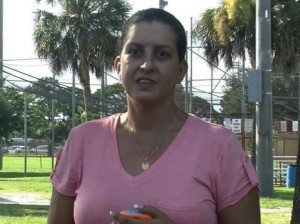Florida mom busted for allowing son to play unsupervised

By William Patrick | Florida Watchdog
FELONY: A Florida mother is facing up to five years in jail for letting her son play unsupervised at a neighborhood playground.
TALLAHASSEE, Fla. — The heavy hand of Florida law enforcement slapped cuffs on a single mother last week for the crime of letting her son play at a neighborhood park by himself.
Charged with child neglect, Nicole Gainey faces up to five years in prison. If convicted, her 7-seven-year-old boy could end up in state custody.
Think the arrest is a small town one-off? Think again, says John Whitehead, a constitutional attorney for the Virginia-based Rutherford Institute.
There are no unusual circumstances in this case, he told Watchdog.org. It could pretty much happen to any family, he said.
Karen Wagner, executive director of the National Parents’ Rights Association, expressed similar concerns.
“There’s nothing written in terms of what rights parents have,” she told Watchdog.org. “There is no bill of rights for parents. Police and government agencies work on a case-by-case basis.”
The Rutherford Institute is providing free legal defense for the Port St. Lucie mother, and sees the arrest as part of a growing trend of over-policing local communities.
Treating minor mistakes as serious crimes is tantamount to living in a police state, Whitehead said.
“For the so-called ‘crime’ of allowing her son to play at the park unsupervised, Nicole Gainey was interrogated, arrested and handcuffed in front of her son, and transported to the local jail where she was physically searched, fingerprinted, photographed and held for seven hours and then forced to pay almost $4,000 in bond in order to return to her family. Gainey’s family and friends were subsequently questioned by the (Florida Department of Children and Families),” reads a Rutherford Institute statement.
Police assert the park was too far away for the child to be left unattended. They responded after receiving a call from a bystander.
Gainey said she frequently allows her son, Dominic, to ride his bicycle to the nearby playground less than half a mile away. She makes him wear a cell phone around his neck and talks with him regularly when he’s outside playing.
On the occasion of Gainey’s arrest, Whitehead said she had just called Dominic and told him to come home for dinner. But a few minutes later, local police arrived, lifted the child over a fence and drove him home in the back of a squad car.
From the backseat, Dominic watched three police officers handcuff his mother, according to Whitehead. When they took her away, the police left the child alone with Gainey’s boyfriend, he said.
A similar arrest occurred in South Carolina last month when a North Augusta mother allowed her daughter to play at a nearby park, also with a cell phone. But when a concerned parent called the police, the mother was taken into custody. Authorities claimed the child was “abandoned.”
Many states have laws specifying how old a child can be before they can be legally left at home unattended, but child protection laws aren’t clear when it comes to leaving children in public places unattended.
That gives police and government agencies the ability to make subjective determinations that many critics say literally creates a government-knows-best nanny state.
“The question is: Who’s the parent? The police or the mother?” Whitehead said. “Police are not trained to make psychological social welfare decisions.”
Parents lose their rights if authorities decide to press charges, said Wagner, a Harvard-educated expert on at-risk children.
“Personally, I believe that leaving a 7-year-old alone, even at a park half a mile away, is putting him in a risky situation. Do I think it’s a felony? No. It might be poor decision making, but it deserves a warning at best,” Wagner said.
Whitehead said Gainey did what probably thousands of parents do everyday.
Whitehead wants the charges dismissed, and said Gainey could probably sue successfully for damages afterward. He warned, however, that a lawsuit could further harm Dominic.







